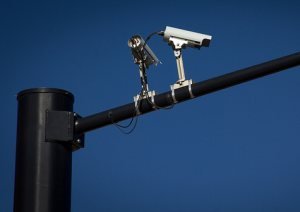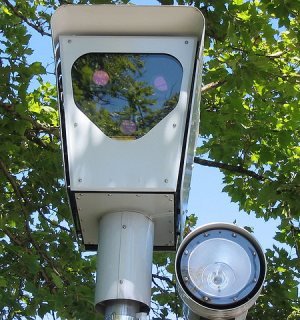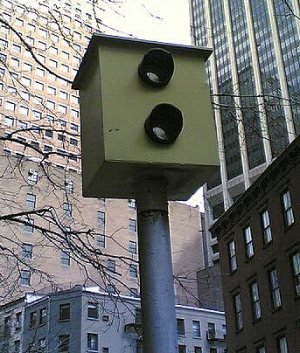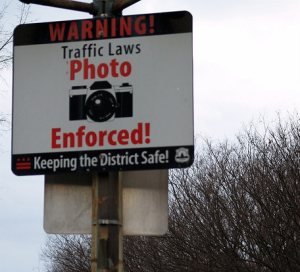This new scam (骗局) will have you slamming on the brakes, not to mention seeing red
By Jessica Citizen | Tecca – Mon, Sep 19, 2011 2:02 PM EDT

Traffic light cameras are annoying at the best of times, but while some people manage to escape the fines, most of us simply pay up without thinking about it or questioning whether the charge is valid. Tricky scammers are taking advantage of that lazy human tendency, making a handful of money and stealing identities in the process.

Scare tactics
The scam is simple. A no-good type picks your phone number at random and, once you answer, tells you that you have an overdue red light camera fine. The only way to avoid a significant late fee, a court case, or even jail time is to pay the bill right then and there over the phone. If you don't pay up, you're threatened with a warrant for your arrest.
Of course, there was no camera, no photograph, and no overdue bill. The scammer really has no ability to arrest you, fine you, or take you to court.
Taken off guard
The voice at the end of the phone line identifies itself as that of a police officer, possibly even giving you a (phony) identification number. As well as trusting you to be lazy and not do your fact checking, the scammer (scam: 骗局) is working on the element of surprise. It's scary to be told you may be facing a jail sentence over something you have no recollection (记忆) of doing, and you'll be more inclined to overlook a few simple signs that should tell you that the phone call is anything but legitimate.

After convincing you to pay the fraudulent (欺诈的) fine, the "traffic cop" will ask for your credit card information, including the security code. That's required information for paying any bill from a remote location. Alarm bells should start ringing as the questions continue, though, as the caller asks for your billing address, date of birth and Social Security number. Surely, the police would have some — if not all — of this information on file. They have your license plate (牌照) in the photo from the red light camera, after all.
That's not our style
No American police agency currently conducts business like this; in fact, no agencies anywhere conduct business like this. The police do not use the telephone to chase down or collect overdue fines or tickets. They use the postal service or, in more dire (灾难的,紧急的) cases, a process server or law enforcement officer.
Even if things did get to the third-party debt collector stage, all correspondence would be carried out in writing, creating an official paper trail that can be traced back and audited if necessary.
The police (and most other authorities) will not ask you for personal information over the phone unless you initiated the call. Dialing the cable company to pay your bill by credit card is one thing — you dialed the numbers, and you can be relatively certain you are connected to the right party. But even with Caller ID, there is no real way to verify incoming calls; if questioned, scammers can come up with a quick excuse. Perhaps they are "calling from a different office" or "a new number that hasn't been set up yet."

Other variations
While this red light camera scam is relatively new (originating in Texas, by the way), it's very similar to another popular identity theft attempt. In that instance, you'll receive a call informing you that you have missed jury duty and — you guessed it — must pay a fine or be slapped with a late fee, along with possible jail time or a court case of your own.
Just like the traffic camera scam, there is no missed jury duty, and the "court official" on the other end of the phone is after your money and your personal information.
Throwing you off the scent
In a particularly nasty twist, you might receive a second call a few days later. The operator made a mistake — it wasn't your car in the photograph, or it wasn't really your name on the jury duty list. Gushing (过度热情的 gush 喷涌) apologies, the caller will fall over himself to reassure you that your credit card will not be billed and that he is very sorry for wasting your time and causing you undue stress.
This second call, of course, is a distraction. You are so happy that you aren't really in trouble that you don't think back over the phone calls too closely and don't think to check your bank account to double-check the transaction. By the time you do check, it's often too late.
Common sense prevails
Fortunately, this simple scam has an equally simple method of prevention. Never, ever provide personal or financial information over the phone, email, text, or mail when solicited (为想要的东西而恳求或请求) by a stranger. At the same time, find out as much as you can about the caller. Get a contact number, name, account number, job title, and any other relevant information that will help you identify them later. Tell them a story about wanting the information in case you need to call back later, if you must. (Hint: They're not going to want to give their details freely.)
If you believe you may have been sucked in by this scam, call your credit card company immediately and cancel your card(s). Look carefully at your statements to see if there are any fraudulent transactions, and report those as soon as you can. Consider getting fraud alerts placed on your credit report by contacting your credit bureau, too; these can be free and well worth your time, if you're concerned.
If you've handed over your Social Security number, slap yourself on the wrist and report that to the authorities, too. You will, unfortunately, need to take further steps to protect yourself from more serious fraud and identity theft.

